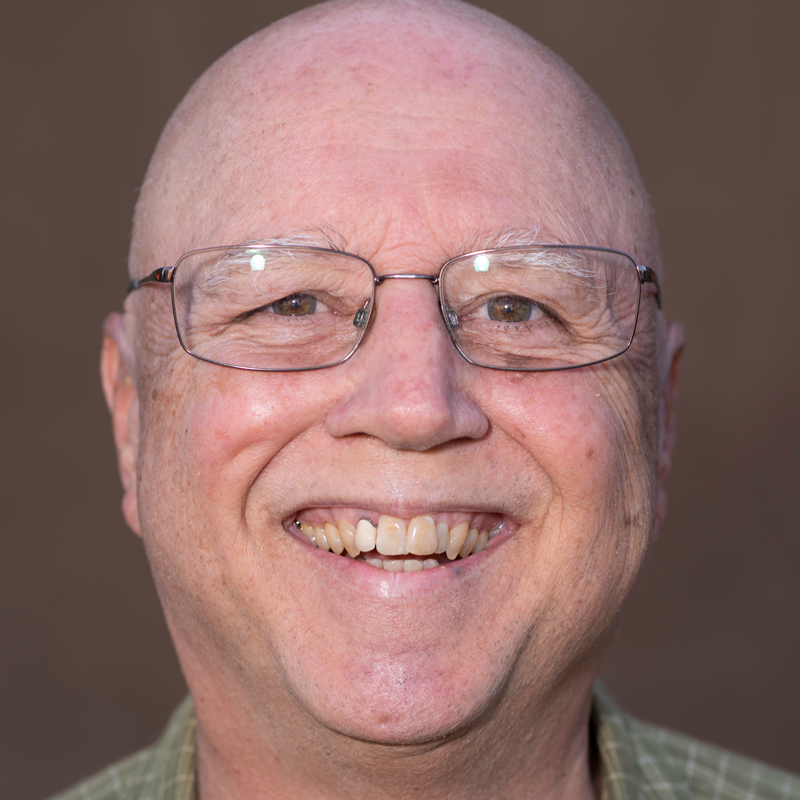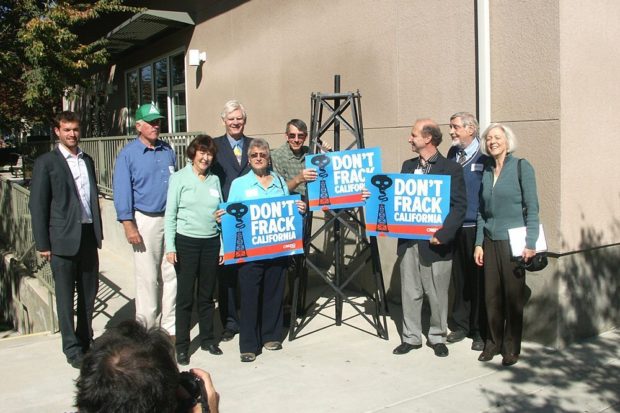
By Chip Ashley
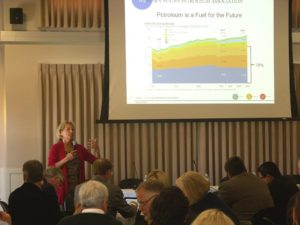
California environmental policy is “schizophrenic.” So says Justin Malan of Heal the Bay, a Southern California nonprofit with a goal of “making southern California’s coastal waters and watersheds, including Santa Monica Bay, safe, healthy and clean.”
Malan was a panelist at a four-hour fracking summit put on by the Independent Voter Project (IVP) and held at UC Merced on Nov. 1. He explained what he meant by “schizophrenia.” On one hand, California has passed AB 32 (2006), the strongest law in the nation so far aimed at limiting greenhouse gas (GHG) emissions. On the other hand, California Governor Jerry Brown, a Democrat lauded as a climate leader, is spearheading an effort to develop a large deposit of Monterey shale that underlies much of the state’s San Joaquin Valley and Central and South coasts. Exploitation of this “resource” would almost certainly wipe out any climate gains attributable to AB 32.
According to industry experts, this shale deposit contains as much as 15 billion barrels of oil, which, if consumed, would add to the atmosphere approximately 6 gigatons of CO2—a little more than 1% of the 565 gigatons Bill McKibben says Homo sapiens can emit by 2050 and still have a reasonable chance of keeping the global temperature rise below 2°Celsius. Perhaps 1%+ and 2°C don’t sound like much. After all, temperatures can vary lots more than 2°C from day to day. But it does mean a great deal in terms of global average temperature. Doubters of the great significance of a rise in global average temperature might want to have a conversation with Hurricane Sandy.
Sandy and other “freak” weather events happening with much greater regularity during the last decade are almost certainly the result of a mere 0.8°C increase since 1750 (the beginning of the Industrial Revolution when humans started using fossil fuels). Even if we humans stopped using fossil right now, we have another 0.8°C increase to go because it takes decades for the heat absorbed in the planet’s oceans to get into the atmosphere. So we might want to think about Sandy on steroids when considering what a 2°C rise instead of a 1.6°C rise might mean. No matter what we do, it will get worse. But if we put in only a token effort, as we have so far done, it will get worse yet.
At the beginning of the Industrial Revolution, when we humans became fossil fools and started burning lots of fossil fuels, atmospheric carbon dioxide measured about 250 parts per million (PPM). In 2013, global atmospheric CO2 crossed the 400 PPM threshold. (Climate scientists say the highest safe level is about 350 PPM, thus the name of McKibben’s organization, 350.org.) When Keeling started measuring atmospheric CO2 in 1958, the level was 315 PPM. That means that since 1750, atmospheric CO2 concentrations have increased by 37.5%. Moreover, two-thirds of that 37.5% increase (25%) has occurred since 1958 when Keeling started keeping records. The rate is accelerating as the world becomes increasingly industrialized.
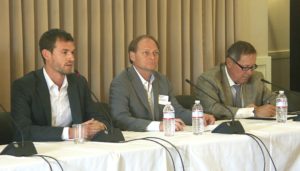 The big oil companies are playing a desperate game of brinksmanship in continuing to supply us fossil addicts. The September 2013 publication of the 5th Report of the Intergovernmental Panel on Climate Change (IPCC) makes this eventuality all the clearer.
The big oil companies are playing a desperate game of brinksmanship in continuing to supply us fossil addicts. The September 2013 publication of the 5th Report of the Intergovernmental Panel on Climate Change (IPCC) makes this eventuality all the clearer.
Several Valley Democrats joined Republican State Senators Tom Berryhill and Anthony Cannella and Assembly Member Kristen Olsen in ballyhooing exploitation of the Monterey shale as a boon to the San Joaquin Valley economy and an opportunity to protect the middle class and raise the poor out of poverty. Rep. Jim Costa (D–Fresno) supported drilling and spoke about natural gas for 15 minutes at UC Merced, never realizing the summit’s topic was fracking for oil, not natural gas. It’s nice to know our representatives are well informed on the issues.
Berryhill, in his downhome, aw-shucks style, opined that this fracking opportunity is “the best thing since sliced bread.”
Olsen opened up a can of old reliable clichés and said we have to support people over salamanders. She never made clear how salamanders are involved.
Valley Democratic Assembly Members Henry T. Perea and Adam Gray joined the chorus on the fracking bandwagon. Perea pointed out that we are moving toward replacing oil with renewables, but the implication was clear that Big Oil would have plenty of time to pump carbon into the atmosphere before the transition is complete. He apparently didn’t get the memo from McKibben and the IPCC.
According to the Sacramento Bee, Perea, Gray and several other “moderate” Democrats were among 12 guests treated in September to a $13,000 dinner hosted by the Western States Petroleum Association at a posh Sacramento restaurant, the Kitchen, “where guests sit in the kitchen as cooks share details of the five-course meal.” Other Democratic diners included Assembly Member Cheryl Brown and State Senators Norma Torres, Ron Calderon and Lou Correa.
“The dinner was held on Sept. 4, as Senate Bill 4 was awaiting a vote on the Assembly floor. The oil industry the next day added amendments that further weakened the already weak legislation opposed by a broad coalition of over 100 conservation, environmental justice and consumer groups.” Bon appétit!
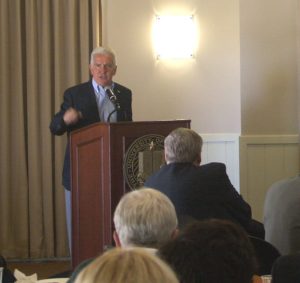
Another prominent Democratic panelist was Mark Nechodom, chair of the California Department of Conservation, recently appointed by Governor Brown in the aftermath of a scandal in which Brown fired the acting chair, Derek Chernow, because of complaints from the oil companies that drilling permits were not being processed fast enough. If Nechodom’s comments during the summit are any indication, delays in permitting will not be a problem during his tenure at the Conservation Department.
Nechodom said there are no documented impacts on water quality from fracking in California. He conveniently limited fracking impacts to the two days during which the actual hydrofracture (fracking) takes place. What happens after fracking is irrelevant, he implied.
He also failed to note that all recordkeeping on fracking up to this point has been done by industry. Surely, the fox always reports to the farmer how many hens he steals. Nechodom’s commentary calls to mind PG&E’s assiduous documenting of chromium hexafluoride dumping at Hinkley and Kettleman City.
Also irrelevant is that Nechodom is Secretary of State Debra Bowen’s husband. Bowen is also a Democrat. California Democrats passed a resolution against fracking at their 2013 convention.
In a related story, the Fresno Bee reported on Nov. 3 that the Central Valley Regional Water Quality Control Board is investigating a fracking fluid spill in Kern County. “They found the fluid laced with boron, salts and a cocktail of notorious chemicals related to gasoline and diesel.” This cocktail sounds a lot like fracking fluid. What are the chances this spill is accounted for in industry recordkeeping?
Except for a couple of oblique references to AB 32, the subject of climate change did not come up until near the end of the summit when this writer asked the panel about the impact that 15 billion barrels of heavy crude might have on the climate. Cathy Reheis-Boyd, president of the Western States Petroleum Association and keynote speaker, dismissed any concern with reference to AB 32, explaining that the 2006 law requires that emissions be reduced to 1990 levels by 2020. AB 32 would take care of it just fine. No worries.
AB 32 limits emissions in California. So the landmark climate change law may require the oil companies to ship the oil to markets outside California, causing emissions elsewhere. Transport adds yet more emissions. Of course, because emissions do not recognize pesky abstractions like the California border, California will still be affected. Reheis-Boyd forgot that climate change is global, and GHG released in China affects California just as much as GHG emitted in California.
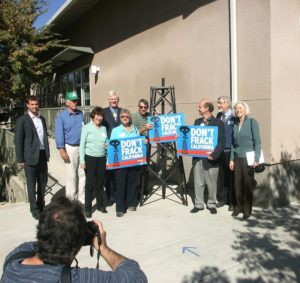
Malan and fellow environmentalist Adam Grinberg of Clean Water Watch performed admirably, but the event was crawling with industry lobbyists and lickspittle politicians. Clearly, Grinberg and Malan were tokens brought in to lend a patina of legitimacy to the IVP event. And on the subject of IVP, according to an article by R.L. Miller published by Daily Kos, IVP is bankrolled with corporate money, including “50 big companies such as Pacific Gas & Electric, Chevron, cigarette maker Altria, [and] Southern California Edison.”
In 2011, the IVP treated California legislators to “a ritzy five-day Maui vacation conference” [strike-through by Miller]. Miller is also chair of the California Democratic Party’s Environmental Caucus.
Attendees of the event were asked to RSVP to Cadee Condit Gray, wife of Assembly Member Adam Gray and daughter of former Rep. Gary Condit. The former Congressman was working the room. As a Congressman, Condit had a reputation as having an eye for the ladies, which got him mixed up in the disappearance/murder of Congressional aide Chandra Levy. Condit was cleared of the allegations when another suspect was arrested and convicted. Cadee Condit Gray is on the board of directors of the communications arm of the IVP.
It is not much of a stretch to infer that this “summit” took place on the UC Merced campus to lend an air of academic credibility and objectivity. Interestingly, when a Sierra Club colleague and I visited the campus a week earlier to muster up student participation, no one we spoke with knew about the event. Even the head of the Student Activities office knew nothing of it. The flyer for the event implies that only certain individuals were notified.
One hopes the VIP attendees can be as dispassionate about fracking as the academic setting intimates. However, this writer got more the impression of the beginning of a feeding frenzy than of academic detachment and scientific objectivity.
*****
Chip Ashley is a local environmental activist, a member of the Tehipite Chapter of the Sierra Club and the new editor of the Community Alliance. Contact him at 559-855-6376 or wattsvalleypreservation@gmail.com.

